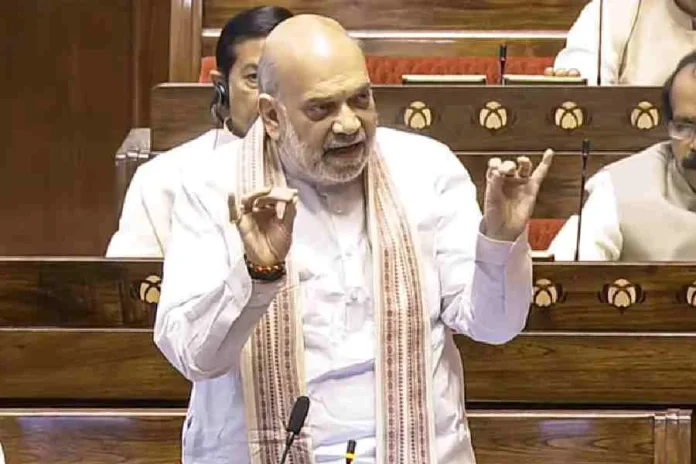NEW DELHI, April 4: In a significant political development, the Rajya Sabha early Friday adopted a Statutory Resolution confirming the imposition of President’s Rule in the violence-hit state of Manipur. Members across party lines supported the decision, though opposition parties strongly criticised the central government for its failure to control the unrest.
Union Home Minister Amit Shah, speaking at the end of the discussion, defended the Centre’s actions and asserted that the government was making every effort to restore peace in Manipur. He stated that the imposition of President’s Rule was not a policy decision but a necessary step due to the prevailing circumstances. Shah informed the House that meetings between the two warring communities—Meitei and Kuki—were underway, with the next meeting scheduled to be held in the national capital. Two such meetings had already taken place in Manipur while the Parliament session was ongoing.
“…We are investing our efforts to bring peace back in Manipur. Thirteen meetings have happened. We brought up the subject late as meetings were going on. The next meeting is in the offing and the issue will see its resolution soon,” Shah said. “The path to communication is open… We don’t use this for political mileage,” he added.
Shah took a strong stance against the opposition, accusing them of spreading misinformation and politicising the situation. He claimed that there was “zero violence” in Manipur currently and that most of the 260 lives lost in the ethnic strife occurred during the first week of violence.
Clarifying the political developments in the state, Shah stated that Manipur Chief Minister N Biren Singh had resigned on February 11. He alleged that the Congress attempted to bring a no-confidence motion against the state government without having the required numbers. “I want to set the record straight. There was no no-confidence motion against the Manipur government. The Congress did not have the required numbers. They were not in a position to bring a no-confidence motion and the chief minister of Manipur had resigned,” he said.
Following Singh’s resignation, no party, including the Congress which has five MLAs, staked claim to form the government, leading to the imposition of President’s Rule.
Shah highlighted ongoing peace talks with both communities in Manipur and criticised the opposition, especially the Congress, for politicising the violence. He referenced past instances of ethnic conflict in the region, pointing out that similar or worse situations occurred under previous regimes. “Seven years ago, a 225-day curfew was imposed in Manipur. Even in those days of the Congress regime, no prime minister visited Manipur,” Shah said.
Addressing concerns from Left parties about the Prime Minister not visiting Manipur, Shah questioned their motives, asking if they were “trying to safeguard Naxalism or violence in Manipur.” He emphasised that Naxalism and ethnic strife are fundamentally different issues.
The Home Minister also targeted the Trinamool Congress (TMC), accusing it of double standards by pointing out the post-poll violence in West Bengal, where he claimed 250 people lost their lives. He further mentioned incidents at Sandeshkhali and RG Kar Hospital as examples of inaction by the West Bengal government. “We are not supporting any gender crime happening in Manipur. We will deal with that. You could not deal with what was happening in West Bengal,” Shah said.
He reminded the House that the Northeast has a long history of ethnic struggles and insisted that the BJP never sought political gains from such conflicts. Citing past incidents, Shah said that the Naga-Kuki conflict in the 1990s, which claimed 750 lives, lasted years without a prime ministerial visit. “Such struggles take time to cool off and many a time five years have taken for normalcy to return,” he said.
Earlier in the session, Leader of Opposition Mallikarjun Kharge initiated the discussion, urging Prime Minister Narendra Modi to visit the state. He criticised the BJP’s handling of the situation and accused the government of abandoning the people of Manipur during a prolonged crisis. “For nearly two years, Manipur has been burning and the government has totally failed in stopping the violence,” Kharge said.
He accused the BJP’s “double-engine” government of bringing “bloodshed, division, and economic collapse” instead of stability. Kharge demanded a thorough inquiry into the violence and called for a white paper to be tabled in Parliament on the issue. “I would urge the prime minister to visit Manipur, meet the affected people, resolve their issues and set right the law and order situation there,” he said.
Despite the sharp political divide, the Rajya Sabha ultimately endorsed the imposition of President’s Rule, reflecting a rare consensus in a deeply polarised atmosphere.

